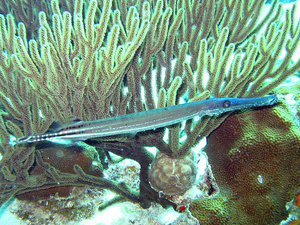Cornetfishes & trumpetfishes
The trumpetfishes and cornetfishes are found in all of the world's tropical oceans. Their huge geographical range, coupled with the fact that there are only a few species of each, make them interesting for dispersal studies and biogeographic analyses.
As their names suggest these fishes exhibit an elongated, fusiform body shape with a horn-shaped mouth. They often congregate in large schools of herbivorous fish, blending in with them and striking at other prey. They have been observed to orient vertically in the water to fool prey into thinking they are seagrass or coral. They feed on small forage fish and crustaceans. Some might say they resemble giant pipefish, and share many of the same behaviors.
Found at depths of up to 200 metres, these fish can disperse relatively far. They inhabit coral and rocky reef slopes. For the most part they appear to be relatively unthreatened, although coral loss may be having an impact on some populations. See the individuals species profiles below to get to know them better.
Aulostomidae (Trumpetfishes) |
|||||
| Photo | Scientific Name | Common Name(s) | IUCN Red List Status | Profile | Range |
 |
Aulostomus chinensis
(Linnaeus, 1766) |
Chinese trumpetfish, flutemouth, painted flutemouth, stickfish, spiny-backed trumpet | LC | Indian & Tropical Pacific |
|
 |
A. maculatus
Valenciennes, 1841 |
Atlantic trumpetfish, Caribbean trumpetfish, trumpetfish |
LC |
Western Atlantic |
|
| A. strigosus
Wheeler, 1955 |
Trumpetfish | LC | South- eastern Atlantic, Brazil | ||
Fistulariidae (Cornetfishes)
| Photo | Scientific Name | Common Name (s) | Red List Status | Profile | Range |
 |
Fistularia commersonii
Ruppell,1838 |
Bluespotted cornetfish, reef cornetfish, smooth flutemouth | LC | Indian & Pacific Oceans, Mediterranean | |
 |
F. corneta
Gilbert & Starks, 1904 |
Pacific cornetfish | LC | E. Pacific | |
 |
F. petimba
Lacepede, 1803 |
Red cornetfish | LC | Global tropical | |
 |
F. tabacaria Linnaues, 1758 | Bluespotted cornetfish, unarmed trumpetfish, | LC | Atlantic |
IUCN Red List key
EX = Extinct
EW = Extinct in the Wild
CR = Critically Endangered
EN = Endangered
VU = Vulnerable
NT = Near Threatened
LC = Least Concern
DD = Data Deficient
NE = Not Evaluated
(Click here for a full explanation of IUCN Red List categories.)
A note on ‘Data Deficient’ species: Species that are assessed as ‘Data Deficient’ are deemed to have insufficient information known about them to carry out a proper conservation assessment. Although such species are not assessed as threatened, we may find out that they in fact are, once enough data is obtained.
[Updated Jan 2020]
